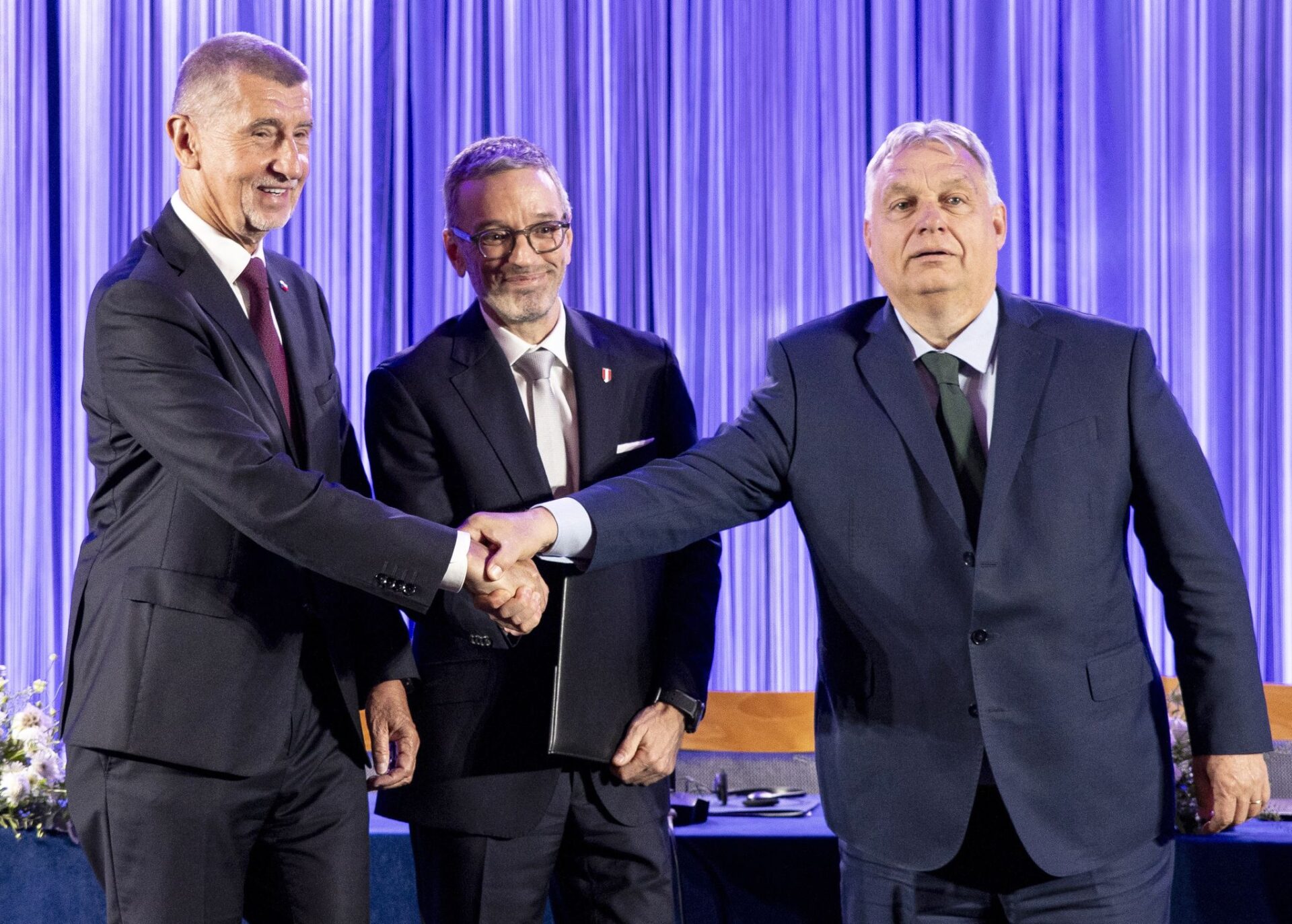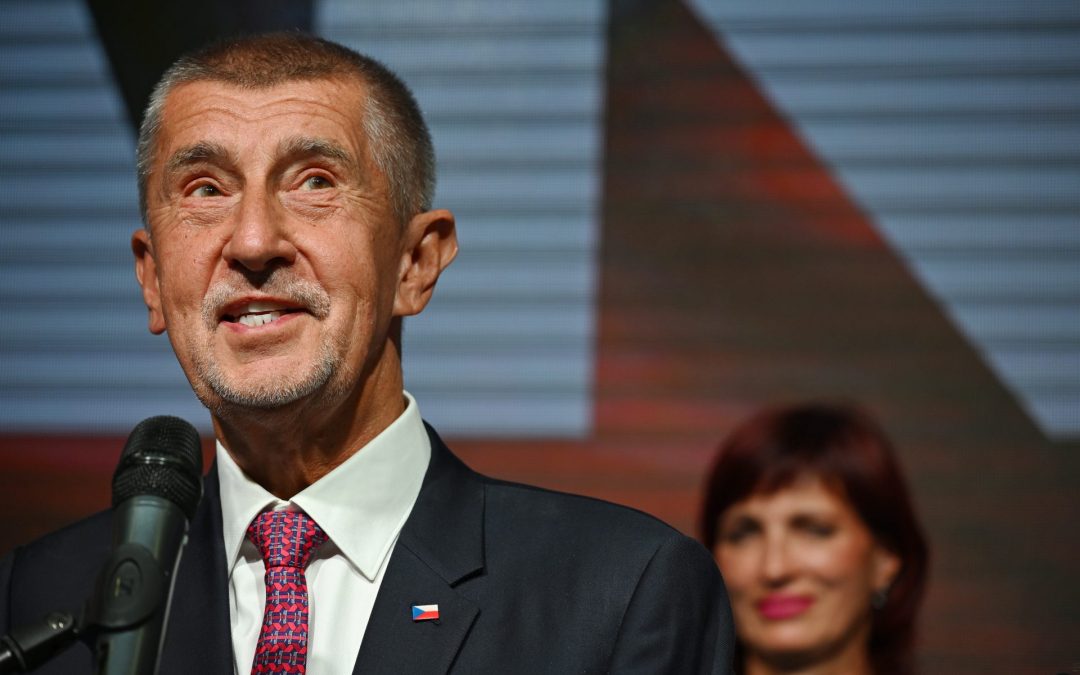 Have the article read by OpenAI (Beta). Please note that AI translations may take some time to process.
Have the article read by OpenAI (Beta). Please note that AI translations may take some time to process.Following his resounding victory in the parliamentary elections in Czechia over the weekend, right-wing populist and billionaire Andrej Babiš emphasised his pro-EU stance, but some of his policies – and his supporters in parliament – spell danger for the Union’s industrial policy and its support for Ukraine.
His opposition movement ANO became the strongest force with just over 34.5 percent of the vote, according to the final results announced by the election commission on Sunday. He is now aiming to form a minority government. Babiš said he would seek backing for his government from the far-right Freedom and Direct Democracy (SPD) movement, which earned 7.8 percent for 15 seats, and right-wing newcomers, the Motorists (AUTO), with 6.8 percent and 13 seats.
Having received Babiš early on Sunday, President Petr Pavel said he would name the new government in November at the earliest to give politicians room for negotiations.
ANO will hold 80 of the 200 seats in the Chamber of Deputies. The centre-right Spolu (Together) alliance led by liberal-conservative Prime Minister Petr Fiala plummeted to 23.4 per cent of the vote (2021: 27.8). At 69 per cent, turnout was higher than in the 2021 parliamentary elections.
Another headache for Brussels?
After his election victory, Babiš stressed that he was pro-European and wanted “Europe to work well”.
But Babiš, who will return to the head of the Czech government after a stint as premier from 2017 to 2021, is likely to be a difficult partner for Europe: during the election campaign, he promised to stop arms deliveries to Ukraine, to “destroy” the Green Deal – the programme for a climate-neutral EU – and to end the European migration and asylum package.
According to ANO’s number two, Karel Havlíček, the next government will immediately send a letter to Brussels to inform it that the Czech Republic will not introduce emission quotas for households and intends to reject the migration pact.
Yet, Babiš will have a problem with the SPD’s push for a referendum on leaving the European Union, said Petr Just, an analyst from the Metropolitan University in Prague.
“It is clear that this issue will be on the table and that it will be the subject of some bargaining,” he said, adding that it gave the SPD some “blackmailing potential” as Babiš will not be able to rule without the party. But Babiš “will obviously not be interested in taking any hasty steps in relation to the EU”, said Just, pointing out the leader’s business interests in western Europe.
His other potential supporters spell trouble for the EU as well: The Motorists first made a mark on the Czech political map when they earned two European Parliament seats in the 2024 vote. Slamming the EU’s Green Deal, the Motorists have advocated for lower taxes and curbing red tape in business, schools, housing, environment protection, farming and other areas. The party wants an exemption from the country’s pledge to join the Eurozone at some point, and it has called for more autonomy within the EU, although it promotes EU membership.
Friends in interesting places
Babiš is considered a friend of the EU-critical Hungarian Prime Minister Viktor Orbán and openly admires US President Donald Trump.
Babiš founded the Patriots for Europe (PfE) group in the European Parliament together with Orban and is often compared to him. But he is neither an ideologue nor a strongly Eurosceptic strategist, but rather a pragmatic politician. So there need not be a radical turn in Czech foreign policy, as Martin Vokálek, from the Brussels branch of the Czech institute Europeum, and Belgian analyst Jean-Michel De Waele, from Université Libre de Bruxelles (ULB) agreed.
Vokálek said ANO was able to use frustration to mobilise its voters and to draw in some of the supporters of extremist and protest parties, but Czech society did not want “a complete departure from the democratic framework and the country’s European orientation,” he pointed out.
“I do not expect a fundamental or radical change in foreign policy under the baton of the likely future Prime Minister Babiš, although even here, it will depend to some extent on the final form of his government,” Vokálek said but added that the tone and priorities were likely to change.
There will be a change in tone, style and priorities in any case.
Martin Vokálek, Brussels branch of the Czech institute Europeum
As far as the impact on the EU is concerned, this is definitely not good news, De Waele said. Babiš at the head of the Czech government may complicate the building of a stronger and more united Europe from an economic, social and military point of view, he added.
Slovak political scientist Radoslav Štefančík, from the Bratislava University of Economics and Business, however said Babiš does not show as much of a pro-Russian attitude like Orban or Slovak Premier Robert Fico. He believes that because the Czech Republic has got rid of its dependence on Russian energy imports, Babiš will not have to engage in unnecessarily positive activities towards Russia, as Orban and Fico are doing.
Potential trouble for Kyiv
However, Babiš has cast doubt on continued help for Kyiv in contrast with the outgoing centre-right government, which has backed Ukraine since the full-scale invasion by Russia in 2022.
“Every year, we send 2.5 billion Euro in the budget to Brussels. And of course Brussels is helping Ukraine. And the new proposal for the new budget includes a large sum for Ukraine. So I think we are there,” Babiš said shortly before the election.
Babiš also told Ukrainian media that Ukraine was “not prepared for the EU” and that “we have to end the war first”.
He has pledged to review a Czech-led international drive launched by Fiala’s government, which has supplied 3.5 million artillery shells to Ukraine since last year. Babiš said he was ready to discuss its future with Ukraine’s President Volodymyr Zelenskyy.
Babiš however, stressed his support for his Polish neighbours and declared that Poland had “always been the Czech Republic’s closest partner”.
“If, God forbid, anything were to happen, we will stand by Poland,” he said, adding that this support also concerns Poland’s eastern border.
Babiš criticised the outgoing government for “burying” the Visegrad Group, a regional cooperation format comprising the Czech Republic, Poland, Hungary, and Slovakia.
Slovakia’s Premier Fico said on Sunday, that he expects Visegrad to strengthen with Babiš at the helm in Prague. “As I know the likely new Prime Minister of the Czech Republic, Babiš, he will be interested in regional cooperation, and it will be very important whether the trio of Babiš, Orbán, and Fico will be able to persuade Polish Prime Minister Donald Tusk in the same spirit. If this happens, we will once again have an extremely strong player in Europe, which I very much welcome.”
Fico is interested in Visegrad as a strong regional player in promoting national interests and hopes to strengthen its role vis á vis Brussels. Slovakia is at odds with Brussels regarding energy imports from Russia, among others.
Babiš also announced his plan to contact Tusk, and the topic for this meeting would be the EU’s Emissions Trading System (ETS2), which covers carbon dioxide emissions generated by households and transport. “The Poles have rejected ETS2 and we must do the same,” he said.
Congratulations from Budapest, Bratislava and the Patriots for Europe
At the EU level, ANO switched from the liberal Renew Europe group to the right-wing PfE in 2024. There it sits alongside Hungary’s Fidesz party, Austria’s FPÖ and Marine Le Pen’s Rassemblement National (RN) from France.

“Truth has prevailed,” Orban wrote on X, speaking of a big step for Czechia. Fico, whom critics accuse of being too friendly towards Russia, congratulated Babiš on his election victory by telephone.
Fico indicated that thanks to Babiš, relations between the countries will calm down. “I think the era when outgoing Czech politicians too often made it clear that they were above us is over.”
“I am sure that after the successful formation of the Czech government, relations between the Czechs and Slovaks will improve significantly,” wrote Slovak Finance Minister and Deputy Chairman of Smer-SD Ladislav Kamenický on social media.
Colleagues from PfE, Jordan Bardella from France and Matteo Salvini from Italy, have congratulated ANO as well. According to Bardella, a wave of support for “free enterprise, an end to repressive ecology and against uncontrolled immigration” has risen in the Czech Republic.
Italian Deputy Prime Minister Salvini said the Patriots for Europe were gaining further support across Europe. “Our friend Andrej Babiš wins the elections in the Czech Republic, defeats the left, and prepares to lead a government that will focus on fighting illegal migration, opposing the war and stopping the crazy policies of Brussels,” Salvini said on X.
If ANO is joined by the Motorists, Prague could become a problem for Ursula von der Leyen. Babiš may stand in the way on some key issues, such as repair loans for Kyiv using frozen Russian assets or the opening of cluster 1 for Ukraine’s accession negotiations. More generally, a Prague driven by sovereignty would broaden the front of attack on some of the pillars of von der Leyen’s programme, starting with industrial issues and the Green Deal. But it is in regard to Ukraine that the EU’s concerns are greatest.
This article is an enr Key Story. The content is based on news by agencies participating in the enr.
